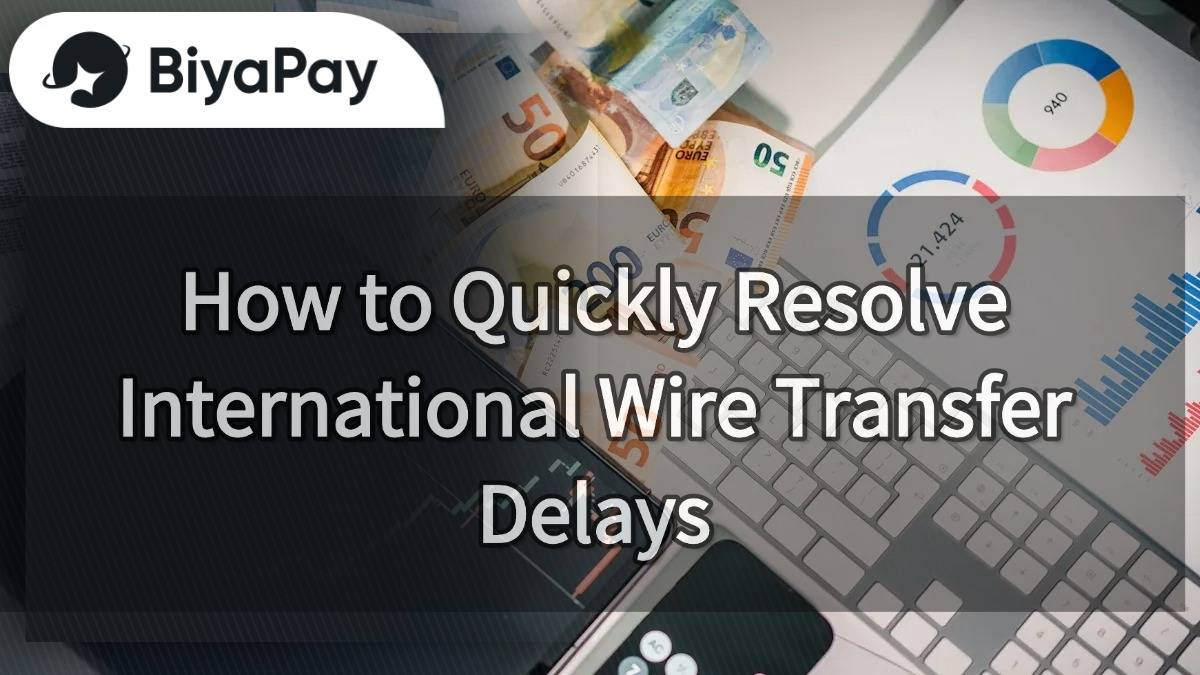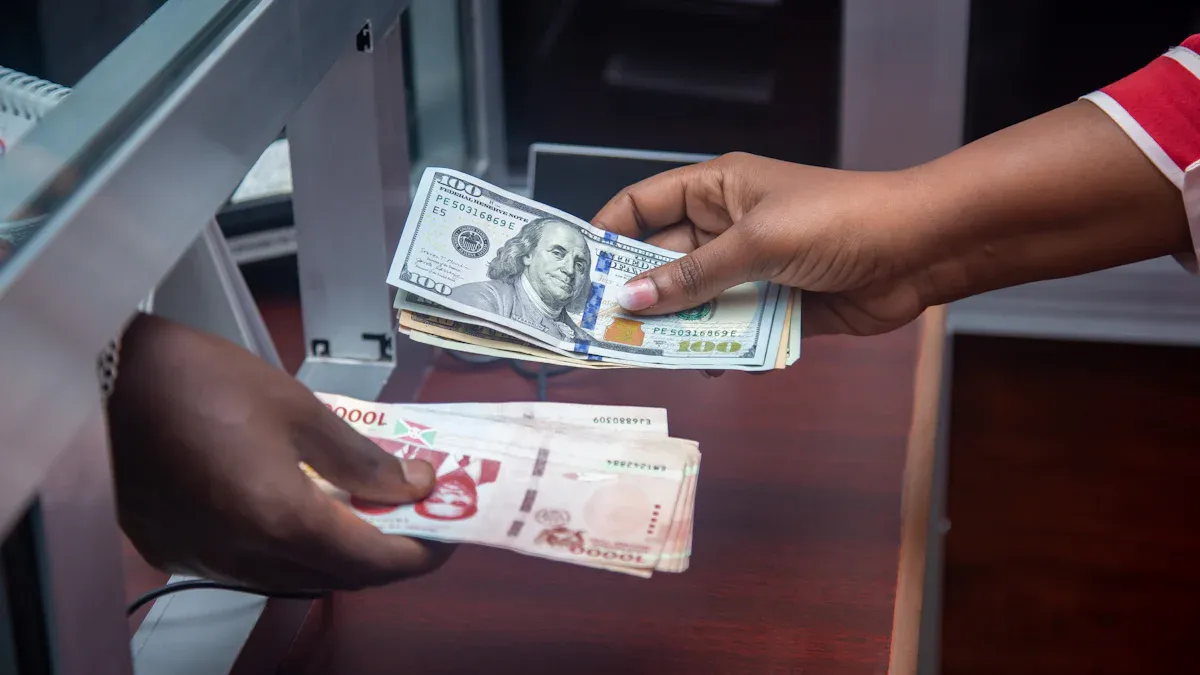- EasyCard
- Trade
- Help
- Announcement
- Academy
- SWIFT Code
- Iban Number
- Referral
- Customer Service
- Blog
- Creator
How to Quickly Resolve International Wire Transfer Delays

Image Source: pexels
International wire transfer delays not only waste time but can also lead to significant financial consequences. For businesses, delays may prevent timely supplier payments, disrupting production and sales, and potentially reducing overall revenue and profits. For individuals, delayed funds in cross-border transactions can disrupt spending plans and limit financial flexibility. Resolving these delays quickly is critical.
Taking direct action is key. First, verify the accuracy of transfer details. Next, proactively contact the relevant banks to confirm if there’s an issue with the transfer timeline. Identifying the problem is essential for resolving delays and avoiding greater losses.
Key Takeaways
- Verify transfer details, ensuring account name, number, and bank codes are correct to prevent delays due to errors.
- Contact the sending bank to confirm transaction status, providing the transaction ID and transfer date for quick issue identification.
- Use MT103 messages to track transfer progress, revealing fund flow and processing stages to address issues promptly.
- Choose efficient payment providers, prioritizing platforms with fast processing to minimize delay risks.
- Retain all transaction records for reference and proof, ensuring swift resolution when issues arise.
Methods to Quickly Resolve International Wire Transfer Delays
Contact the Sending Bank to Confirm Transaction Status
When a wire transfer is delayed, the first step is to contact the sending bank to confirm the transaction status. Reach out via the bank’s customer service hotline or website. Providing details like the transaction ID, transfer date, and amount helps the bank locate the issue quickly.
Banks like those in Hong Kong often offer online tools to check transaction status directly in your account. If the status shows “processing” or “pending,” it may indicate internal review. In such cases, wait patiently or inquire about expected processing times.
To avoid delays, select efficient payment providers. Opt for platforms with fast processing, robust risk management, and strong identity verification to reduce transaction delays significantly.
Verify Recipient Account Information
Incorrect recipient account details are a common cause of transfer delays. If a delay occurs, immediately verify details such as the account name, number, and bank code (e.g., SWIFT code).
If errors are found, contact the sending bank promptly to correct them. Some banks may require supporting documents, like identity or account ownership proof, to expedite corrections.
Ensure details meet the bank’s requirements, as some countries have specific account formats or additional stipulations. Researching these rules in advance prevents delays.
Use MT103 Messages to Track Transfer Progress
The MT103 message is a key document in international wire transfers, detailing the sending bank, receiving bank, and intermediary bank activities. If standard tracking fails, request the MT103 from the sending bank.
The MT103 reveals the funds’ path and current processing stage. For instance, if funds are held at an intermediary bank, you can contact that bank or ask the sending bank to intervene.
Keep all related records when using MT103 messages. These aid in tracking and serve as evidence if disputes arise with banks or institutions.
Inquire About Intermediary Bank Processing
Intermediary banks can be a bottleneck in international wire transfers. If delays occur, contact the sending bank to obtain intermediary bank details and check if funds are stalled there. This clarifies the funds’ path and delay causes.
Common intermediary bank delay factors include:
- Latency: Processing times may extend, especially during peak periods.
- Error Rate: Transmission errors can slow progress.
- Traffic Volume: High transaction volumes may reduce processing speed.
- Saturation: Limited system resources can exacerbate delays.
Latency metrics, measured in percentiles (e.g., p50, p95, p99, p999), show response time distributions. Tail latency (p999) often impacts transfer times significantly. Request these metrics from the bank to assess delay severity.
Success is typically gauged by HTTP status codes: 2xx and 4xx indicate success, while 5xx signals failure. A high 5xx rate in intermediary records warrants further investigation.
Provide Required Documents to Expedite Reviews
Banks may request additional documents during wire transfers to comply with regulations. Ensure all documents are complete and accurate to shorten review times. Common documents include:
- Transfer Proof: E.g., MT103 messages detailing the transaction.
- Identity Documents: Passport or ID copies to verify the sender’s identity.
- Transaction Documents: Contracts or invoices proving transaction legitimacy.
Submit clear, error-free documents. Errors or omissions can cause further delays. Confirm document requirements with the bank in advance to avoid repeated submissions.
If additional documents are needed, provide them promptly and verify receipt. Proactive communication speeds up the review process and reduces delays.
Seek Bank Customer Service Assistance
When standard methods fail, bank customer service is a vital resource. Hong Kong banks offer multiple channels, including phone, live chat, and email. Choose the most convenient option and clearly explain the issue.
Customer service efficiency impacts resolution speed. Data shows optimized processes increased daily call handling from 800 to 2,200, reduced human interventions from 3.2 to 1.1, and raised satisfaction by 22 NPS points. Here’s a comparison:
| Metric | Before | After |
|---|---|---|
| Daily Call Volume | 800 | 2,200 |
| Recovery Rate | 18.7% | 27.4% |
| Human Interventions | 3.2 | 1.1 |
| Per-Customer Cost (RMB) | 15.6 | 6.3 |
| NPS (Satisfaction) | N/A | +22 points |
| Cross-Sell Success Rate | N/A | +19% |
Provide details like transaction IDs and documents during communication to help the team resolve issues quickly with professional guidance.
Common Causes of International Wire Transfer Delays

Image Source: pexels
Extended Bank Processing Times
Bank processing times are a primary cause of delays. Efficiency varies, and during peak periods, processing slows due to additional verification, reviews, or clearing. For example, Hong Kong banks typically process wires within business days, but holidays or maintenance can extend timelines. To mitigate, initiate transfers during off-peak periods and confirm bank schedules.
Complex International Transfer Processes
International transfers involve multiple stages, each prone to delays. Key stages include:
| Stage | Description | Processing Time |
|---|---|---|
| Transaction | User initiates payment, verifies identity, and sends instruction. | N/A |
| Clearing | Institutions exchange instructions, calculate amounts, involving matching and data collection. | N/A |
| Settlement | Final account transfers based on clearing, settling debts. | N/A |
Delays in any stage, like clearing congestion or settlement coordination, prolong transfer times. Use efficient banks or platforms to minimize intermediary delays.
Incorrect Recipient Account Information
Errors in recipient details, such as account numbers or SWIFT codes, often cause delays. Funds may be returned or held until resolved. Double-check all details before sending and confirm with the receiving bank if unsure to prevent such issues.
Intermediary Bank Delays
Intermediary banks facilitate transfers between sending and receiving banks but can cause delays due to:
- High Transaction Volumes: Slows processing during peaks.
- Information Errors: Incomplete or incorrect details require clarification.
- Compliance Reviews: Extra checks for large or sensitive transactions.
Tip: Request an MT103 message from the sending bank to track funds through intermediaries, identifying delay points.
To reduce risks, select banks with strong intermediary partnerships, ensure accurate details, and avoid peak periods.
Transaction or Amount Under Review
Banks may review transactions to comply with anti-money laundering and international regulations, delaying transfers.
Common Review Triggers
- Large Amounts: High-value transfers face stricter scrutiny.
- Sensitive Regions: Transactions involving certain countries trigger additional checks.
- Unusual Activity: Transfers deviating from account history raise flags.
Handling Reviews
- Submit Complete Documents: Provide clear contracts or invoices.
- Contact the Bank: Clarify requirements and assist promptly.
- Be Transparent: Explain transaction purpose to expedite reviews.
Note: In China, reviews are stringent, especially for large transfers. Prepare documents in advance to comply.
Proactive measures shorten review times and reduce delays.
Preventing International Wire Transfer Delays

Image Source: pexels
Ensure Accurate Recipient Account Information
Even minor errors in account details can delay or fail transfers. Verify the account name, number, and SWIFT code meticulously. In China, use bank-issued account verification documents, valid within 180 days, with stamps and matching details. For business accounts, legal representatives must provide ID for verification. These steps prevent errors.
Choose Reliable Banks or Services
Select banks with strong reputations and efficient processing, like Hong Kong banks, which maintain robust intermediary partnerships. Platforms offering real-time status tracking help identify issues early, reducing delay risks.
Avoid Peak Transfer Periods
Peak times, like holidays or month-ends, increase transaction volumes, slowing processing. Initiate transfers during regular business days to avoid congestion. Plan ahead, allowing buffer time for critical payments.
Understand Destination Country Regulations
Researching destination regulations prevents freezes or failures. Common regulations include:
- Automotive Finance Company Measures
- Insurance Sales Conduct Measures
- Interim Pension Insurance Company Supervision Measures
- Bank and Insurance Operational Risk Measures
- Consumer Finance Company Measures (Draft)
- Currency Broker Data Service Notice
In 2023, 515 fines were issued, affecting nearly 400 individuals, with 20 institutions facing million-level penalties for data protection violations, highlighting strict compliance.
To comply:
- Check Regulations: Visit destination financial authority websites.
- Consult Experts: Hong Kong bank support can clarify requirements.
- Monitor High-Risk Areas: Prepare extra documents for sensitive regions.
Tip: For sensitive destinations, provide contracts or invoices to prove legitimacy, avoiding review delays.
Retain All Transaction Records
Keeping complete records streamlines tracking and dispute resolution. Save:
- Transfer Proof: MT103 messages and confirmations.
- Identity Documents: Passport or ID copies.
- Transaction Documents: Contracts or receipts.
In China, records are critical for strict reviews, especially for large transfers. Use digital tools like cloud storage for easy access and to prevent loss, ensuring quick responses to issues.
Swift resolution of wire transfer delays requires clear actions. Optimizing processes, shortening settlements, and offering multi-currency options boost efficiency. Technology and compliance further reduce risks.
Understanding delay causes and prevention—verifying details, choosing reliable banks, avoiding peaks—is crucial. Planning and record-keeping ensure smoother handling of complex cases.
Prepare thoroughly before transferring to minimize errors, saving time and avoiding losses. These steps help you navigate wire transfer challenges confidently, ensuring timely and secure fund arrivals.
FAQ
1. How long do international wire transfers typically take?
Transfers usually take 1–5 business days, depending on the sending, receiving, and intermediary banks’ efficiency. Holidays or peak periods may extend this.
2. Why do international wire transfers get delayed?
Delays stem from long bank processing, incorrect account details, intermediary issues, or reviews for large amounts or sensitive regions.
3. How can I track an international wire transfer’s progress?
Use the sending bank’s online platform or customer service. Request an MT103 message for detailed fund flow and status updates.
4. What if recipient account details are incorrect?
Contact the sending bank immediately to correct errors. Provide supporting documents to expedite changes and minimize delays.
5. How can I prevent international wire transfer delays?
Verify account details, choose reliable banks, avoid peak periods, and research destination regulations to ensure smooth transfers.
International wire transfers often face 1-5 day delays due to incorrect details, intermediary bank issues, or compliance reviews, compounded by costly bank fees and tedious verification processes. BiyaPay delivers a swift, cost-effective solution for global payments! Exchange over 30 fiat currencies and 200+ cryptocurrencies with real-time rate tracking to secure optimal pricing, with fees as low as 0.5% across 190+ countries, with same-day transfers arriving on the day of initiation. Its intuitive interface minimizes errors, and real-time tracking simplifies monitoring. Sign up for BiyaPay in just one minute to seamlessly handle tuition, shopping, or supplier payments, safeguarded by robust multi-factor verification. Earn a 5.48% annualized yield on flexible savings. Licensed under U.S. MSB and New Zealand FSP, BiyaPay meets global standards. Join BiyaPay today to eliminate delays and enjoy efficient transfers!
*This article is provided for general information purposes and does not constitute legal, tax or other professional advice from BiyaPay or its subsidiaries and its affiliates, and it is not intended as a substitute for obtaining advice from a financial advisor or any other professional.
We make no representations, warranties or warranties, express or implied, as to the accuracy, completeness or timeliness of the contents of this publication.




Contact Us
Company and Team
BiyaPay Products
Customer Services
is a broker-dealer registered with the U.S. Securities and Exchange Commission (SEC) (No.: 802-127417), member of the Financial Industry Regulatory Authority (FINRA) (CRD: 325027), member of the Securities Investor Protection Corporation (SIPC), and regulated by FINRA and SEC.
registered with the US Financial Crimes Enforcement Network (FinCEN), as a Money Services Business (MSB), registration number: 31000218637349, and regulated by FinCEN.
registered as Financial Service Provider (FSP number: FSP1007221) in New Zealand, and is a member of the Financial Dispute Resolution Scheme, a New Zealand independent dispute resolution service provider.




















